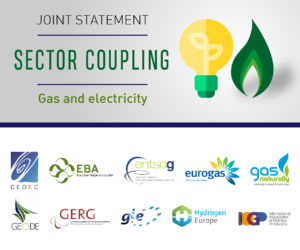Joint statement: Delivering a Climate Compatible and Cost-Efficient European Energy Infrastructure
JOINT STATEMENT: ELECTRICITY AND GAS SECTOR COUPLING

The achievement of the Paris Climate Agreement objectives is a top priority for the European Union. Building a smart and cost-effective energy system will be the key to delivering on these objectives in the EU. Therefore, it is vital that both the gas and electricity sectors commit to supporting a joint approach to delivering an infrastructure that can deliver the EU’s climate targets.
We commend the approach that has been taken to ensure the right infrastructure developments for the next decade, as ENTSOG and ENTSO-E will work together, also with distribution system operators, on their Ten-Year Network Development Plans (TYNDPs).
Going forward, this process must be maintained in order to facilitate cooperation and sector coupling between the sectors, which will reduce costs associated with the energy transition for the consumer. This process can facilitate the large-scale integration of renewables, enabling grid balancing and seasonal storage, as well as the decarbonisation of natural gas through innovative technologies.
Utilising gas and electricity together is required to achieve the climate targets. That is why it is important that the full potential of renewable and decarbonised gas is recognised in the planning process. A recent study by Navigant found that there could be over 400bcm of renewable and decarbonised gas in the EU energy system in 2050. Alongside this, Frontier Economics demonstrated that utilising the existing gas infrastructure could save close to 900 billion Euros, while still achieving our climate objectives.
It is important that we utilise all the technologies available to us to deliver on the climate objectives, and in doing so we will be able to bring the citizens of the EU along on this journey in an economically and socially acceptable way, rather than applying a full system change that through its economic and societal impacts could turn out to be unpopular, more expensive and therefore more difficult to pursue.
Not only this, utilising more hydrogen through power-to-gas, biomethane and decarbonised gases utilising CCUS, will provide significant industrial opportunities for the EU. Europe can maintain its position as the manufacturing leader of electrolysers and anaerobic digestors and other clean technologies, if we make the right choices now to achieve our climate ambitions.
The signatories of this joint statement have committed to:
• Develop a consistent and clear taxonomy of renewable, decarbonised and low carbon gases. To this end the gas industry has initiated consulting on its ideas around a taxonomy and is working with all stakeholders to find a common agreement as soon as possible. These gases should also be assessed alongside electricity decarbonisation options in a manner that reflects all their different lifecycle emissions.
• Support the ENTSO-E and ENTSOG joint assessment of the potential of gases and electricity in 2030 and 2050 - in the context of the updating of their Ten Year Network Development Plans. This will identify the role that gas and electricity will play in decarbonising the EU economy and support smart policy making to ensure we develop the technologies we need to deliver on our Paris commitments.
• Develop a cost-effective and no regrets energy infrastructure to guide efficient investments. This work has begun in the joint scenario work for their TYNDPs with ENTSO-E and ENTSOG, in consultation with the DSOs and other stakeholders, utilising a cost benefit analysis approach to decide where to build electricity or gas infrastructure. This is based on long term projections for gas and electricity demand, using the most recent analyses available, to be Paris Agreement compliant. The process is ongoing and we call for all energy organisations to support the work and contribute to developing the most realistic scenario possible to achieve sector coupling.
We support the ongoing process of joint planning for sector coupling that is underway and look forward to continuing to work on the basis of conclusions from the Copenhagen Forum held on the 23 and 24 May, where further conclusions on the process will be presented and discussed.
Signatories:
European Federation of Local Energy Companies (CEDEC)
European Biogas Association (EBA)
European Network of Transmission System Operators for Gas (ENTSOG)
The Voice of Local Energy Distributors Across Europe (GEODE)
HydrogenEurope
GasNaturally & its members: Eurogas, Gas Infrastructure Europe (GIE), International Association of Oil and Gas Producers (IOGP), Marcogaz, The Natural & bio Gas Vehicle Association (NGVA Europe), The European Gas Research Group (GERG)
___________________________________________________________________________________
Press contact: ENTSOG AISBL; Av. de Cortenbergh 100, 1000-Brussels; Tel: +32 2 894 5100; Fax: +32 2 894 5101; info@entsog.eu www.entsog.eu, VAT No. BE0822 653 040